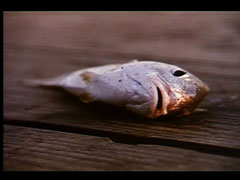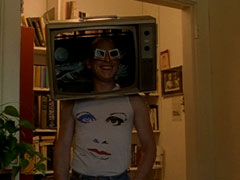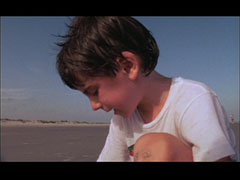Bringing images back to life
by José Manuel Sande
Like the chapters or succesive instalments of a novel, the American cineast Ross McElwee (Charlotte, North Carolina, 1947) builds up a film diary in the course of his work, as rigorous as it is suggestive, a story in the first person with abundant ramifications.
Considered as a linguistic or existential search, the diary shows talent in multiple directions. McElwee is one of the documentary film-makers from the USA who, first appearing in the seventies, have contributed to the renewal of the non-fiction film. In his case this manifests itself by means of two fundamental elements; firstly, the abandonment of the predominant (one might even say at that time obligatory) tendency of cinéma vérité or direct cinema with its decided disdain for subjectivity; secondly, the singularity with which he integrates narrative devices of diverse origin, a mixture of genres that validates (and subtly subverts) classicism, the traditional short observational documentary and the home movie.
Champion of the autobiographical documentary and an explorer of images, his singular narrative voice, the itinerary or journey into which he transforms his films, the established ironic self-portrait and his interests in his own processes of filming; all these characteristics have given rise to a concentrated and very personal trajectory. His filmography, made up of ten or so titles, has obtained the approval of both the critics and the public, with the satisfaction beginning with Sherman´s March (1986), a prizewinning title at the Sundance Festival, of a normal premiere of his works in cinemas, a situation assisted by the brilliant academic side of his work as a Harvard professor.
Context and Ruptures
Since the seventies, the displacement of the non-fiction film, defined by its informative character or its significance or historical objectivity, has brought about a polyphony of proposals for new approaches. Years of challenge from different directions and the increasing demolition of the integrity of the traditional feature film (with found footage, remontage, home movies and biographical films, filmed diaries and portraits, even false documentaries) have resulted in many derivative voices and a sizeable array of works of real value with those special turning points that are the deciding factors in the evolution of the practice of documentary film-making. In the last quarter of the 20th century and the beginning of the 21st the varied developments in the American documentary have passed from the alchemical transformations between fiction and non-fiction and from the journeys filmed by cineasts such as Robert Kramer to the different degrees of recycling and remontage of Baldwin, Rosenblatt or Rappaport; from the appropriationism of Barbara Hammer and the documentary of intervention of Moore to the incisive essay of Thom Andersen; from the stylised portraits of Errol Morris to the domestic sketch of Alan Berliner, to the numerous footsteps of the vanguard – we may think here of the inheritance in construction by Mekas – and to the proper and lasting observational tradition (from Leacock and the Maysles to the master, Frederick Wiseman). It is from these developments that such a stimulating panorama of the aesthetic evolution of the documentary in the United States can be extracted.
In this context McElwee, a director in whom the intimate and the contemplative coexist, continues to play an important role, reinforced by the increasing amount of work he has produced from the eighties onward. He graduated from Brown University where he was much influenced by a particular teacher, the novelist John Hawkes, the author of Six O´clock News (1996). McElwee represents a rupture from the traditional documentary with its offscreen voice, omniscient and detatched, at a time when part of the legacy of direct cinema and its (apparent) lack of mediation is coming to an end. Like a story-telling shaman, he weaves relations and reactions into a sort of subjective performativity that on occasion contains something of the essayist, a dialogue with the world full of reflection, introspection and freedom of form.
Voice and verbalisation play a crucial role in his films. An autobiographical text written at the request of Raymond Bellour in 1995 for the specialist French magazine Trafic – reproduced in the only monographic study edited in Spain about his work, Paisajes del yo. El cine de Ross McElwee/Landscapes of the I. The cinema of Ross McElwee (2007), an edition coordinated by Efren Cuevas and Alberto N. Garcia – appeals from its title (Finding a Voice) to the author´s great obsession, the necessity of finding an expressive voice capable of overcoming the film-maker´s invisibility and the (impossible) attempt at the pure objectivity of verite. In this sense, he retains a self-confessed influence from Hawkes, an advocate of carrying over the artist´s personal experience into the artist´s own work. After his intial excursions as a writer and as a photographer, McElwee combined these interests, discovering during a stay in France in 1973 both the start of an understanding of film-making and an addiction to it.
In Charleen (1978), McElwee´s initiation piece, the verite that is being looked for suffers slight distortions – even though there is no commentary – by means of the perceptive relation that the camera establishes with the film´s protagonist, a friend and former teacher of his. But the stress on the film-maker´s personal perspective and active involvement was not long in coming. Backyard (1984) immerses itself in the seach for the autobiographical dimension and the subjective offscreen voice in a story about his father and his brother. From the self-conscious narrative and from a certain sense of responsibility to the images themselves, McElwee starts to shape the construction of a personage: himself. In Sherman´s March (1986) – with the subtitle A meditation on the possibility of a romantic history of the South during the era of the proliferation of nuclear weapons – McElwee´s personal voice, clear, confessional, inventive, takes over the film for the first time. McElwee makes fun of the conventions of the didactic, historical documentary and talks of the Civil War, of Southern culture, of ethnography and contemporary socio-politics at the same time that he reveals intimate aspects of his life – the breaking-up of a relationship, the search for a new girlfriend. In addition McElwee contributes to authenticate the piece by working practically unaided with the use of a body-camera (a happy expression of Josep Maria Catala), which is of course a very appropriate term for any film-maker in the documentary branch of cinema (in particular when using 16 millimetres).
Time Indefinite (1993) carries further McElwee´s exploration of the family and his honest homing-instinct for life´s big themes. A wedding, pregnancies, deaths and numerous appearances by the author go into a robust and mature film that derives from Six O´clock News, and expands the galaxy that is called McElwee with a relevant reflection on the use of images and the means of communication.
In Bright Leaves (2003) he sets-up various stories. The tale of his great-grandfather, a tobacco merchant, who seems to have served as the inspiration for an old style Hollywood melodrama (The King of Tobacco, 1950) directed by Michael Curtiz. Three generations later, the author embarks on a journey to South Carolina accompanied by his ghosts – from Curtiz to his grandfather – knowing that the initial excuse for the journey could be transformed at any moment and could change not only the film but also his ideas on life.
After In Paraguay (2008), a film of a family trip to Paraguay, his latest film, Photographic Memory (2011), praised at the Venice Festival, draws together some of the elements already mentioned. The complex relation with a son already grown and a trip to French Brittanny where he recovers the stage of his life as a wedding photographer, these allow McElwee to give a new lease of life to his archive and to offer images of somebody else (of his son, Adrian) and articulate an emotional discourse on the passage of time and the history of his images and his filmed material, including going deep into the debate between digital and anological processes.
When he refers to his work on film, McElwee proposes a curious parallel with the sphere of medicine. He employs the term "autopsy". This expression with its terrible post-morten images and references quickly redeems itself in its cognate sense of a critical analysis or personal examination. The driving idea in his works is to "restore some idea of the life you feel you should have had". "Monet with a film camera", Ross McElwee becomes a lucid analyst of our times, an investigator, coherent and generous in his approximations to the representation of the real, in his use of memory and his mastery of the complex tools of film-making. Certainly he is one of the few emblematic film-makers in that constant inflow of effort to produce new work that is open, creative and exciting on which contemporary non-fiction film depends.








